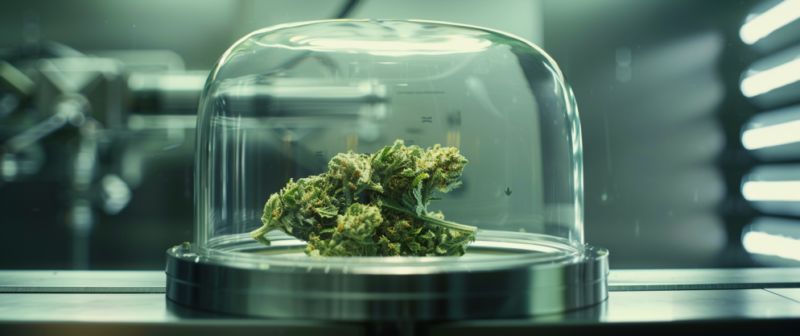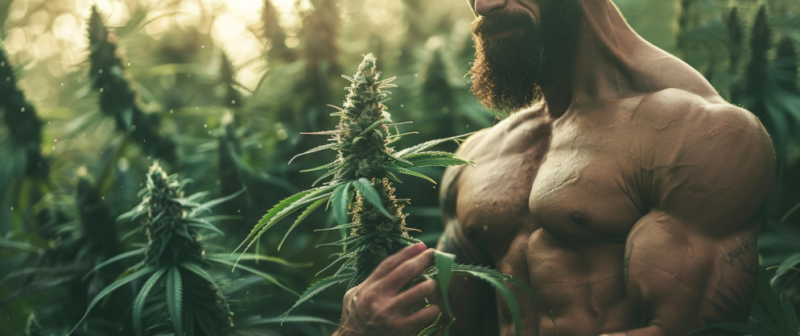Is Delta 8 Natural
Delta 8 has been gaining popularity, but many people still question its natural origins. We discuss the source of delta 8 and how it is extracted, and if you’re curious to know about is Delta 8 natural.
Find out about the potential uses of delta 8, its possible side effects, and whether it is safe to use. Find more about the natural aspects of delta 8.
What Is Delta 8?
Delta 8 is a chemical compound, specifically a tetrahydrocannabinol (THC) variant, that interacts with the endocannabinoid system in the human body.
As a member of the THC family, Delta 8 shares similarities with Delta 9, the more well-known psychoactive compound found in cannabis. However, Delta 8 distinguishes itself by having a lower psychotropic potency, making it a milder option for those seeking the benefits of THC without overwhelming effects.
When ingested, Delta 8 binds to the CB1 receptors in the endocannabinoid system, primarily located in the brain and central nervous system. This interaction prompts various physiological responses, influencing mood, appetite, nociception, and more.
Is Delta 8 Natural?
Delta 8, often referred to as Delta 8 THC, is a naturally occurring chemical compound found in cannabis plants, but it is typically derived through chemical synthesis due to its low natural concentration. The Agriculture Improvement Act of 2018 has influenced the legal status and manufacturing processes of this intriguing cannabinoid.
What Is the Source of Delta 8?
Delta 8 is sourced from cannabis plants, where it exists in small quantities among various other cannabinoids.
While Delta 8 occurs naturally in cannabis plants, its extraction process has gained significant attention in recent years due to the passing of the Agriculture Improvement Act of 2018. This Act legalized the production of hemp, a variety of cannabis plants that contain low levels of THC, the psychoactive compound found in marijuana.
How Is Delta 8 Extracted?
Due to its low natural abundance, the extraction of Delta 8 typically involves chemical synthesis, often utilizing solvents and advanced laboratory techniques to isolate and concentrate this cannabinoid.
Chemical synthesis for Delta 8 extraction typically involves starting with the precursor molecule, commonly obtained from:
- hemp plants or
- other cannabis varieties.
Solvents play a crucial role in dissolving the target compound, helping to separate Delta 8 from the raw material. These solvents can range from:
- ethanol
- hydrocarbons like butane or propane
- supercritical carbon dioxide
Laboratory techniques such as chromatography, distillation, and crystallization are then employed to purify and concentrate the Delta 8 extract to desired potency levels.
Natural Occurrence of Delta 8 THC
Delta 8 THC is a minor cannabinoid found in cannabis plants, distinguished from its more well-known cousin, Delta 9 THC, by a slightly different chemical structure.
Presence in Cannabis Plants
- Trace Amounts: Delta 8 THC naturally occurs in cannabis plants but only in very small quantities. It is an isomer of Delta 9 THC, which is more abundant in cannabis.
- Formation: Delta 8 THC is typically formed through the degradation of Delta 9 THC. Over time, and under the influence of heat and light, Delta 9 THC can oxidize to become Delta 8 THC.
Natural Extraction Methods
Extracting Delta 8 THC directly from cannabis involves several steps to isolate and concentrate this minor cannabinoid:
- Initial Extraction:
- Solvent Extraction: The first step typically involves extracting the full spectrum of cannabinoids from the plant material using a solvent like ethanol, CO2, or hydrocarbons (e.g., butane).
- CO2 Extraction: This is a preferred method for its ability to preserve the delicate compounds and avoid residues. It uses supercritical CO2 to extract cannabinoids efficiently.
- Fractional Distillation:
- Once the crude extract is obtained, fractional distillation is employed to separate the different cannabinoids based on their boiling points.
- This method can isolate Delta 8 THC from the other cannabinoids and impurities in the extract.
- Chromatography:
- Advanced techniques like high-performance liquid chromatography (HPLC) can further purify Delta 8 THC. This method is precise and effective in isolating specific cannabinoids from complex mixtures.
Concentration Levels in Nature
- Low Natural Concentration: The natural concentration of Delta 8 THC in cannabis plants is typically very low, often less than 1%. This makes natural extraction less practical and less efficient compared to synthetic production methods.
- Conversion from Delta 9 THC: Some extraction methods may involve converting Delta 9 THC to Delta 8 THC to increase yield, as Delta 8 THC is more stable and less psychoactive than Delta 9 THC.
Consumer Considerations for Delta 8 Products
As Delta 8 THC gains popularity for its unique psychoactive effects, consumers need to navigate a complex market to ensure they are purchasing safe and legal products. Key factors such as purity, safety, legal status, and sourcing practices play crucial roles in making informed decisions.
1. Purity and Safety of Delta 8 Products
- Third-Party Testing: Ensure that the Delta 8 products you purchase have been tested by independent, third-party laboratories. These tests should check for the presence of contaminants such as heavy metals, pesticides, and residual solvents, also the potency and purity of the Delta 8 THC itself.
- Transparent Sourcing: Opt for brands that are transparent about their sourcing practices. Knowing where the hemp is grown and how it is processed can provide insight into the quality and safety of the product.
- Ingredient List: Carefully review the ingredient list on the product label. High-quality Delta 8 products should contain minimal additives and artificial ingredients.
- Consumer Reviews and Brand Reputation: Research consumer reviews and the reputation of the brand. Positive feedback and a history of reliability can be indicators of a trustworthy product.
2. Legal Status and Regulatory Issues
- Federal Legal Status: As of 2024, Delta 8 THC exists in a legal gray area in the United States. Under the 2018 Farm Bill, hemp-derived cannabinoids are generally legal if they contain less than 0.3% Delta 9 THC. However, the legal status of Delta 8 varies by state, with some states banning it outright.
- State-Specific Regulations: Check the specific regulations in your state before purchasing Delta 8 products. States like Alaska, Arizona, Arkansas, Colorado, Delaware, Idaho, Iowa, Mississippi, Montana, Rhode Island, and Utah have restrictions or outright bans on Delta 8 THC.
- FDA and Other Regulatory Bodies: The FDA has not approved Delta 8 THC for any medical use, and it has issued warnings about potential health risks. The regulatory landscape is evolving, so stay informed about any new developments that may affect the legality and safety of Delta 8 products.
3. Recommendations for Consumers Seeking Natural Delta 8
- Seek Organic Certification: Choose products that are certified organic. This certification ensures that the hemp was grown without synthetic pesticides, fertilizers, or genetically modified organisms.
- Whole Plant Extracts: Consider products made from whole plant extracts rather than isolated Delta 8. Whole plant extracts may contain other beneficial cannabinoids, terpenes, and flavonoids that can enhance the overall effect through the entourage effect.
- Low-Temperature Extraction Methods: Opt for products extracted using low-temperature methods such as CO2 extraction. These methods preserve the natural integrity of the cannabinoids and terpenes.
- Direct Purchase from Producers: Whenever possible, buy directly from reputable producers. This can ensure a shorter supply chain and more control over product quality.
- Educate Yourself: Stay informed about the latest research and developments in Delta 8 THC. Understanding the science behind the product can help you make more informed decisions about what you consume.
What Are the Potential Uses of Delta 8?
Delta 8 is gaining attention for its potential uses in various areas such as therapy, medication, discomfort management, and relaxation, offering a range of benefits for different users.
Recreational Uses
Recreationally, Delta 8 is often used for relaxation, stress relief, and mood enhancement, with some users also reporting improved concentration.
Many people find that Delta 8 helps them unwind after a long day, easing physical and mental tension. Its calming effects can create a sense of tranquility and peace, making it a popular choice for those looking to de-stress or simply relax. People often use Delta 8 to uplift their spirits and enhance their overall mood, boosting happiness and well-being. Some individuals notice that Delta 8 can aid in sharpening focus and improving productivity, allowing them to tackle tasks with a clearer mind and increased alertness.
What Are the Potential Side Effects of Delta 8?
While Delta 8 can offer various benefits, its potential side effects include adverse events such as nausea, vomiting, and confusion, which users should be aware of.
Though Delta 8 is generally well-tolerated, some individuals may experience these side effects, particularly when consuming high doses. Nausea can manifest as discomfort in the stomach, leading to an urge to vomit. Conversely, vomiting may occur as the body’s way of expelling the substance, causing discomfort. Confusion can arise due to the impact of Delta 8 on cognitive functions, potentially affecting decision-making and memory.
Users must monitor their reactions to Delta 8 and consult with healthcare professionals if these side effects persist or worsen. Sometimes, these symptoms may signal an adverse reaction and require medical attention. Being informed about the potential risks can help individuals make safer and more informed choices when using Delta 8 products.
Is Delta 8 Safe to Use?
The safety of Delta 8 use largely depends on factors like contamination, appropriate dosing, and understanding the associated risks.
-
What Are the Factors to Consider Before Using Delta 8?
Before using Delta 8, it’s crucial to consider factors such as the proper dose, potential contamination, and the associated risks and adverse effects.
Proper dosing is key in terms of Delta 8 consumption. Start with a low dose and gradually increase it to find the right balance for your body.
Contamination can be a significant issue, so purchase from reputable sources to ensure purity. Understanding the risks and adverse effects is essential to making an informed decision—possible side effects may include increased heart rate, dry mouth, and potential stress.
Knowing these factors can help you have a safe and positive experience with Delta 8.
-
Are There Any Risks Associated with Delta 8?
The use of Delta 8 carries certain risks, including adverse effects and the potential for substance abuse and addiction.
Delta 8, a cannabinoid derived from hemp and cannabis plants, has gained popularity for its psychoactive properties that are milder than Delta 9 THC. Its legal status and regulation remain ambiguous in many places, leading to concerns about product quality and safety. The lack of comprehensive research on Delta 8 also challenges understanding its long-term effects on physical and mental health. Individuals using Delta 8 products may experience side effects such as stress, paranoia, increased heart rate, and impaired coordination, especially when consumed in high doses.
What Are the Legalities Surrounding Delta 8?
Delta 8’s legal status is complex and varies by jurisdiction, with federal laws such as the Controlled Substances Act and regulations by the Food and Drug Administration playing significant roles.
Under the Controlled Substances Act, Delta 8 is considered an isomer derived from hemp, making it legal if derived from hemp and containing less than 0.3% Delta 9 THC.
The FDA has raised concerns about the sale of Delta 8, stating that it has not been evaluated or approved for safe use in any context.
As a result, some states have taken their own stance on Delta 8’s legality, with some explicitly allowing its sale, while others have banned it outright due to concerns regarding its psychoactive effects and potential public health risks.
Final Thoughts – Is Delta 8 Natural
While Delta 8 can be considered a natural product derived from cannabis plants, its prevalent use and availability often rely on chemical synthesis, highlighting the importance of understanding relevant laws and accurate information.
While Delta 8 stands out as a natural derivative, the processes involved in its extraction and production involve synthetic methods to enhance its concentration and accessibility to consumers. This intersection between natural and artificial elements in Delta 8 production underscores the significance of being well-informed about legal regulations surrounding its usage and sale.
Accurate information regarding the source, composition, and effects of Delta 8 is crucial for consumers to make informed decisions and ensure their safety and compliance with local laws.
Frequently Asked Questions
How does Delta 8 interact with the endocannabinoid system?
Delta 8 THC binds to the CB1 receptors in the endocannabinoid system, primarily located in the brain and central nervous system. This interaction influences various physiological responses, such as mood, appetite, nociception (discomfort perception), and more.
Can Delta 8 be found in both hemp and marijuana plants?
Yes, Delta 8 THC can be found in both hemp and marijuana plants, but in very small quantities. Hemp plants, which are legally defined as containing less than 0.3% Delta 9 THC, are often used as the primary source for extracting Delta 8 THC due to their legal status under the 2018 Farm Bill.
Is Delta 8 legal in all states?
No, the legality of Delta 8 THC varies by state. While the 2018 Farm Bill federally legalized hemp-derived cannabinoids, including Delta 8 THC, some states have banned or restricted its use. It’s important to check your local laws before purchasing or using Delta 8 products.


